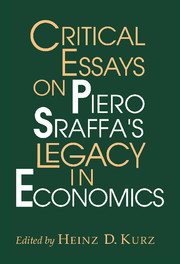Book contents
- Frontmatter
- Contents
- Preface
- List of contributors
- Part I Introduction
- 1 Piero Sraffa's contributions to economics: a brief survey
- 2 Revisionist findings on Sraffa
- Part II Returns to scale, demand, money and interest, and the classical tradition
- Part III Long-period theory and the problem of capital
- Part IV Intertemporal equilibrium theory and the problem of capital
- Mathematical Note by Michele Tucci
- Author index
- Subject index
2 - Revisionist findings on Sraffa
Published online by Cambridge University Press: 05 June 2012
- Frontmatter
- Contents
- Preface
- List of contributors
- Part I Introduction
- 1 Piero Sraffa's contributions to economics: a brief survey
- 2 Revisionist findings on Sraffa
- Part II Returns to scale, demand, money and interest, and the classical tradition
- Part III Long-period theory and the problem of capital
- Part IV Intertemporal equilibrium theory and the problem of capital
- Mathematical Note by Michele Tucci
- Author index
- Subject index
Summary
Piero Sraffa was a great economist whom I remember with warm admiration. He wrote too little, which is our loss. His reputation tends to get tied up with ideological jockeyings within our profession. Perhaps this is inevitable but I regret it – for, ideology aside, mainstream economists of the mathematical or literary persuasion can benefit much from Sraffa's contributions and also from the problems that his works pose for further investigations.
By chance, the New Palgrave (Eatwell, Milgate and Newman, 1987) contains two articles on Sraffa, both of some length. The one by me originated accidentally: I was not the editors' natural choice for this topic, but they wanted my participation and were willing to indulge my preferences to write out some views on Wicksell and also on Sraffa. The other Palgrave article on Sraffa, by John Eatwell and Carlo Panico, is seen to have some overlap with mine; still readers of this valuable new reference will, I daresay, benefit from the differences in viewpoint registered by the different authors. (It should be said that, until the finished volumes appeared, I could not benefit from the thoughtful Eatwell–Panico treatment; that is perhaps all for the better since differences can be more interesting than agreements.)
Here, also by invitation of hospitable editors, are some further thoughts on Sraffa. They are neither listed in strict chronological order nor ranked by relative importance.
- Type
- Chapter
- Information
- Critical Essays on Piero Sraffa's Legacy in Economics , pp. 25 - 108Publisher: Cambridge University PressPrint publication year: 2000
- 6
- Cited by



